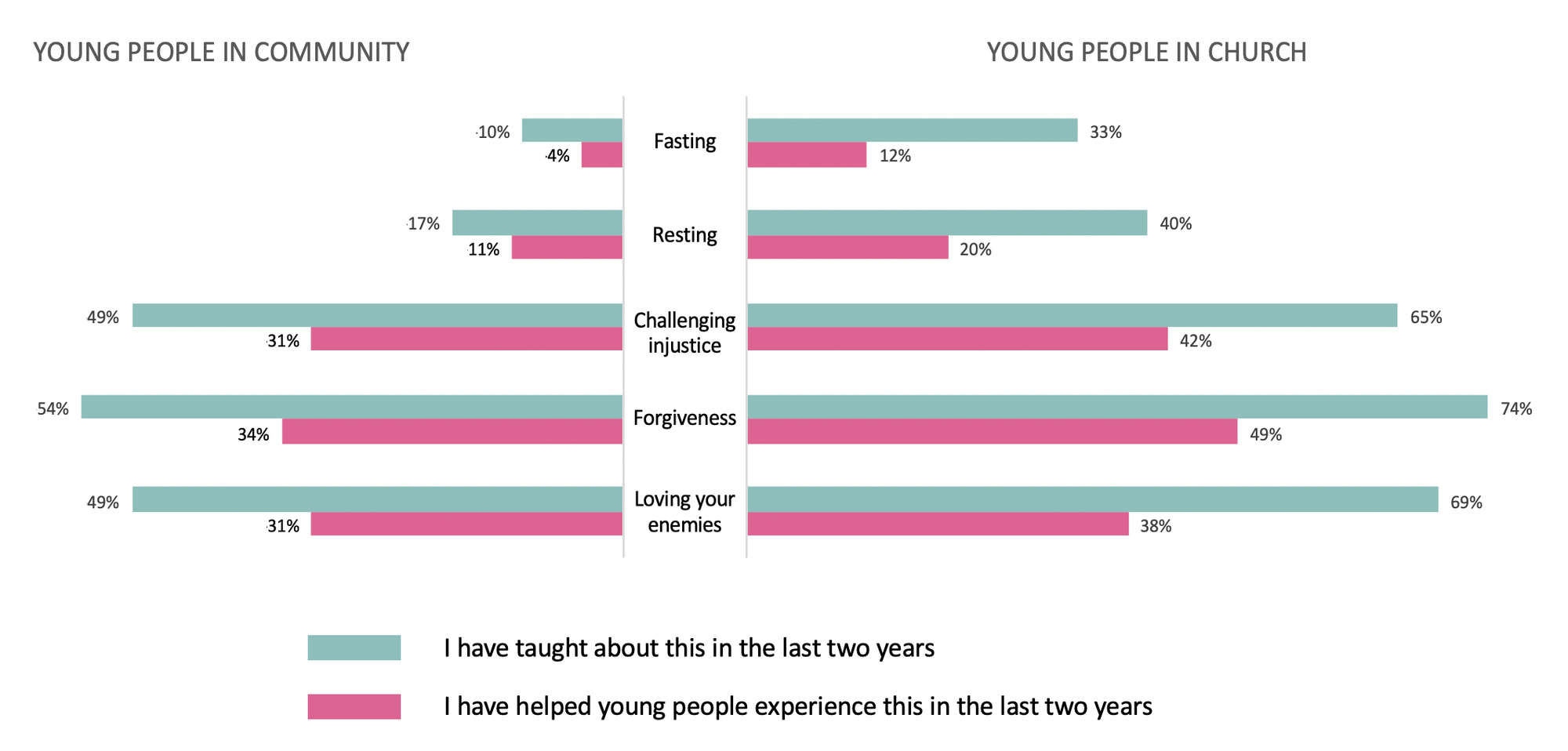Survey and case study data highlight the way that Christian practice can help young people encounter God and develop faith of their own.
In our culture, personal experience is the gateway to truth. So it’s no surprise we are seeing renewed interest in spiritual practice. This research draws on existing literature, a survey of 235 youth workers and 13 case studies, to explore the key role of Christian practice in contemporary youth ministry.
Following the trail
In 2018 the Centre for Research published No Questions Asked, a small-scale qualitative study that identified low levels of curiosity amongst young people when it came to questions about God. For some of these interviewees it was spiritual practices that engaged their curiosity, while they tended to feel less comfortable with propositional statements about God. This confirmed the findings of other research and resonated with much of what we experienced in our local youth work. So, we began thinking a little more about the idea of ‘spiritual experiments’ – inviting young people to try out faith in different ways. ‘We do God’ is the next part of this journey. Continuing to follow the trail, this study takes the temperature of the youth ministry community when it comes to practising faith and identifies key lessons for those wanting to explore practice-based mission and discipleship.
The research
There were three parts to this project. First, we reviewed and summarised key ideas from theologians, youth workers and researchers on the role of practice in youth ministry and why ‘experiential apologetics’ might be particularly important for young people in Generation Z. We then identified 13 case studies where youth workers were inviting young people, who were not part of churches, to try out Christian practice. These case studies comprise documents and interview data from 21 adults and nine young people. We also conducted an online survey of 235 Christian youth workers across the UK, exploring their own practices and how they help young people experience Christian faith, both within and beyond the Church.
Key learning from the case studies
Here are the headlines of what we learned from those who are already doing this.
- Practice has a role to play at all stages of a journey of faith. It might facilitate ‘threshold experiences’, help young people form habits of faith, or even de-convert ‘churched’ young people so they have the choice to embrace a more radical and faithful Christianity.
- Practices facilitate encounter with God, reflection and engagement with the world. Because Christian practice is rich in its diversity it can engage young people who have different preferences, personalities, needs and learning styles.
- Modelling, listening, trust and commitment are key features of practice-based ministry. Practice is not an ‘off the shelf’ resource. It is a commitment to co-discipleship that is rooted in young people’s lives. Ideally it is modelled by the whole community, not just youth workers.
- Young people’s age, church experience and socio-economic background will affect how they engage in practice. There are lots of ways you might have to adapt the invitation to ‘join in’, e.g. developing corporate practices with younger teenagers rather than focusing on individual devotional habits.
- There are some barriers to overcome, in order to integrate practice more fully into youth ministry. Churches need to make space for young people’s participation and focus on discipleship, not just attendance. Young people may need support where they lack self-awareness, curiosity or confidence to participate. And of course, where practice is counter-cultural, not everyone will want to ‘do God’.

Key findings from our survey
And here’s what we learned from the 235 youth workers who completed our survey.
Youth ministry is already alive with practice…
On average, youth workers told us they were intentionally engaging in 13 of the 21 practices and a third (32%) reported having a ‘rule of life’. Our literature review showed that, in many ways, youth ministry has developed its own culture of practice, which was reflected in our survey. When asked about practice in their own words, youth workers emphasised activities centred on relationship-building, learning and growth, and young people’s well-being.
…but there are some things we do lots of and some things we do very little of.
There was a significant gap between the practices that youth workers do and don’t engage in, with those taking part in the survey being most likely to intentionally engage in the practices of worship, service and church attendance and least likely to engage in fasting, lament or living simply.
Youth workers help young people try out different practices depending on whether or not they are part of churches…
We asked youth workers what practices they had taught young people about and what they had helped young people directly experience. Studying scripture, forgiveness, service and prayer are all in the top five practices youth workers have taught young people about, within and beyond the Church, while fasting, resting and living simply are the least taught for both groups. But there is some distinction between the groups when it comes to experience.
“For me, young people outside of the church respond much better to being able to practice and experience something that is ‘real’ in terms of faith expression. And ‘allowing’ them or creating space for them to ‘try it out’ has been risky but has worked for us.”
Youth workers were most likely to help young people who aren’t part of churches experience celebration, followed by hospitality and prayer. In contrast, youth workers were most likely to help young people within churches experience worship, prayer, attending church and studying scripture.
…and there are gaps between what we teach and what we invite young people to experience
In general, youth workers reported being more likely to teach about practices than help young people to experience them, whether those young people are in churches or not. There are some examples where this theory/practice gap is particularly significant (see below). The survey also showed that youth workers spend significantly less time helping young people to experience God than on other youth work aims.

Youth workers know the value of experience when reaching out to young people…
They told us that when young people see Christian practice it can authenticate claims about God’s love, while taking part themselves helps young people directly experience God’s life and community. Missional practice was perceived to be both culturally relevant (e.g. healing, testimony and hospitality) and culturally radical (forgiveness, lament and rest), suggesting that some practices will be more immediately attractive to young people, while others will be more challenging.
…but engage less with young people outside church communities
Mission to young people outside the Church was reported to be a significantly lower priority for these youth workers than meeting young people’s social/emotional/practical needs or the discipleship of young people who attend church. It follows that youth workers in our survey were significantly less likely to engage young people outside of churches in practice than those within the Church (whether that’s through teaching or experience).
So what does this all mean?
We think there are three key invitations to the youth ministry community and wider Church off the back of this piece of research (though of course you may interpret it all differently).
1) BROADEN OUR PRACTICE
We don’t want to turn the practices into some holy ‘to-do’ list, and we can’t engage in everything. Nevertheless, the research suggests that there are practices that we somewhat neglect (fasting, resting, lament) and others that particularly build bridges to young people’s culture (testimony, challenging injustice, creativity). We can’t lead where we haven’t been, so the invitation is to us first.
2) PRACTICE WHAT WE PREACH...
…and preach what we practice. There are some big gaps between verbal teaching and practical experience, and we have the opportunity to close these gaps wherever we can. There are some aspects of Christian life that we need to teach about more (e.g. celebration and hospitality), and there are others that we need to invite young people to put into practice themselves. (e.g. forgiveness and challenging injustice).
3) BRING PRACTICE INTO THE HEART OF MISSION
In John 7:17 Jesus says that “Anyone who chooses to do the will of God will find out whether my teaching comes from God or whether I speak on my own.” We have the opportunity to facilitate experiences of Christian practice that don’t just meet young people’s needs and make faith plausible but help them encounter Jesus as well.
Video from research launch
Dr Lucie Shuker walks through the findings of We do God in this launch presentation which you can watch below.






